Related Research Articles
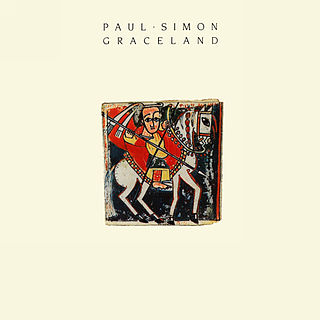
Graceland is the seventh solo studio album by the American singer-songwriter Paul Simon. It was produced by Simon, engineered by Roy Halee and released on August 25, 1986, by Warner Bros. Records. It features an eclectic mixture of genres, including pop, rock, a cappella, zydeco, isicathamiya and mbaqanga, inspired by the music of South Africa.

Ladysmith Black Mambazo is a South African male choral group singing in the local vocal styles of isicathamiya and mbube. They became known internationally after singing with Paul Simon on his 1986 album Graceland. They have since won multiple awards, including five Grammy Awards the fifth of which they dedicated to the late former South African President Nelson Mandela.

Mbube is a form of South African vocal music, made famous by the South African group Ladysmith Black Mambazo. The word mbube means "lion" in Zulu. Traditionally performed a cappella, the members of the group are male although a few groups have a female singer. In this form, groups of voices singing homophonically in rhythmic unison are employed to create intricate harmonies and textures.
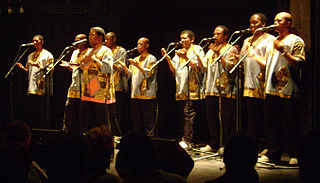
Isicathamiya is a singing style that originated from the Zulu people, a South African ethnic group. In European understanding, a cappella is also used to describe this form of singing.
Dr. Bhekizizwe Joseph Shabalala was a South African singer and musician who was the founder and musical director of the choral group Ladysmith Black Mambazo.
The Ladysmith Black Mambazo Foundation was set up in January 1999 by Ladysmith Black Mambazo lead singer and founder Joseph Shabalala. The foundation teaches the history of South African music styles isicathamiya and, to a lesser extent, mbube.
This is a near-complete list of recordings made by the South African vocal group Ladysmith Black Mambazo.

The Very Best of Ladysmith Black Mambazo – Rain, Rain, Beautiful Rain is a 2-disc compilation album by the South African isicathamiya group Ladysmith Black Mambazo. It was released in the United Kingdom in November 2004, to coincide with the group's tour of the UK that month.
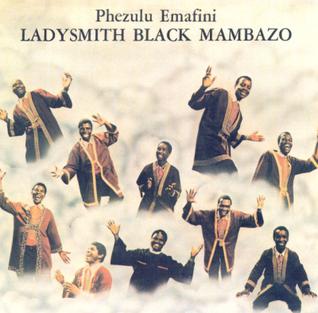
Phezulu Emafini, a Zulu phrase meaning high in the clouds, was the 8th studio release by the South African isicathamiya group Ladysmith Black Mambazo. The album, released in 1976, is composed entirely of Zulu Christian religious compositions by composer, director, and lead singer Joseph Shabalala.
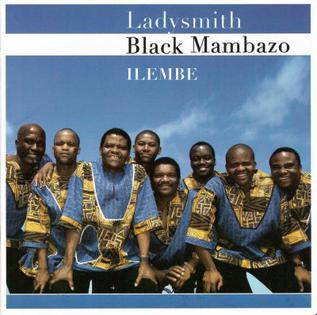
Ilembe is a 2007 album by the South African isicathamiya group Ladysmith Black Mambazo. It was released on 26 February 2007 and did not feature collaborations, and was simply "Ladysmith Black Mambazo at its best", as the Gallo press release for the anticipated release put it. It was re-released in 2008 with the title Ilembe: Honoring Shaka Zulu.
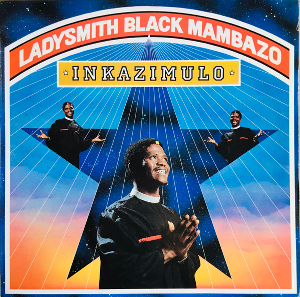
Inkazimulo is an album by the South African isicathamiya group Ladysmith Black Mambazo. The members who sang in the Inkazimulo album were Joseph Shabalala Inos Phungula Albert Mazibuko Headman Shabalala Jabulani Dubazana Russell Mthembu Geophrey Mdletshe Abednego Mazibuko Jockey Shabalala Ben Shabalala. It was released in 1985 and was a primarily religious release. The album was recorded a year before the group's collaboration with Paul Simon on his Graceland album and tour.

Umthombo Wamanzi is an album by the South African isicathamiya group Ladysmith Black Mambazo. The album was recorded in May 1982, and released the next month. Whilst the group's previous output had been, for the most part, entirely composed by lead singer and founder Joseph Shabalala, Umthombo Wamanzi contained primarily traditional Zulu hymns re-arranged by Shabalala, such as "Uzube Nami Baba" and "Ungikhumbule". The members who sang in the Umthombo Wamanzi album were Abednego Mazibuko Jockey Shabalala Albert Mazibuko Jabulani Dubazana Headman Shabalala Fikile Groonwell Khumalo Russell Mthembu Joseph Shabalala.

Induku Zethu is an album by the South African isicathamiya group Ladysmith Black Mambazo. The album shows the group on the front cover photograph wearing traditional Zulu attire, with lead singer and founder Joseph Shabalala out front brandishing a spear. The album was released in 1983, and reissued internationally in 1984 by Shanachie Records.

Shaka Zulu is a 1987 album by South African a cappella group Ladysmith Black Mambazo.

My Dream – African Sounds is a 2008 release by the South African groups Ladysmith Black Mambazo and the SABC Choir. It was released on 30 September 2008. The album is a collaboration of both isicathamiya and choral music.

"Diamonds on the Soles of Her Shoes" is a song by the American singer-songwriter Paul Simon. It was the fourth single from his seventh studio album, Graceland (1986), released on Warner Bros. Records. The song features guest vocals from the South African male choral group Ladysmith Black Mambazo.

Always With Us is a 2014 album by the South African isicathamiya group Ladysmith Black Mambazo. The album, released on 15 January 2014, is a tribute to the life of the group's matriarch Nellie Shabalala (1953-2002), the late wife of Mambazo leader Joseph Shabalala. It is also only the second album in the group's 50-year career to feature female Zulu vocalists singing alongside the male members.

Two Worlds One Heart is an album by the South African choral group Ladysmith Black Mambazo, released in 1990. The first single was "Township Jive", which the group had performed on the Graceland tour.

Journey of Dreams is an album by the South African vocal group Ladysmith Black Mambazo, released in 1988. Journey of Dreams also served as the title of a film about frontman Joseph Shabalala, directed by David Lister and shot around the same time. Shabalala chose the title in part to describe his journey from his birthplace of Ladysmith to international success. It also refers to his desire to get the sound he heard in his dreams on to record.
Mhlahleni James "14" Shabalala was a South African Maskandi musician who came from Bergville in KwaZulu-Natal. He was part of the alternative music scene in South Africa. Shabalala was very popular as a result of his live performances at festivals and concerts throughout the country. He performed at the Splashy Fen festivals in the 1990s, and toured with musicians such as Joseph Shabalala and Ladysmith Black Mambazo.
References
- ↑ Walter Bernhart, Werner Wolf, David L. Mosley Word and Music Studies: Essays on the Song Cycle 2001 "The fact that the song "Homeless" was co-written with Ladysmith Black Mambazo lead singer Joseph Shabalala reinforces the collaborative effort. The album was recorded in South Africa, the U.S., and England. ...Undoubtedly, the degree of African influence on the music of Graceland varies greatly: while "Homeless" is a fully integrated collaboration between Simon and Ladysmith Black Mambazo, the last two tracks on the album, "That Was Your ..."
- ↑ Mary Fitzpatrick South Africa, Lesotho & Swaziland 2004 p.58 "Ladysmith's Zulu isicathimiya music, enjoying renewed popularity ever since the group guested on the Graceland song 'Homeless', is a prime example of the way traditional South African music used Western influences to produce unique musical styles.
- ↑ Veit Erlmann Nightsong: Performance, Power, and Practice in South Africa 1996 p. 94 "The role of Ladysmith Black Mambazo in the making of the album consists, in a nutshell, of the coauthoring by Paul Simon and Joseph Shabalala of "Homeless" and of the introduction in "Diamonds on the Soles of Her Shoes""
- ↑ Jonathan C. Friedman The Routledge History of Social Protest in Popular Music 2013 p. 315 "Although Ladysmith Black Mambazo is not often associated with protest music, some of their songs also point out the inhumanity of apartheid, especially with regard to causing problems related to crime and poverty. “Homeless” is.."
- ↑ The World & I 1987 Volume 2, Issue 10 - p.215 "But at the same time, Shabalala has explained that the phrase "we are homeless" is very similar to the words a Zulu uses when proposing to ..."
- ↑ Linda Flower The Construction of Negotiated Meaning 1994 "In the Public Eye One inescapable feature of "Homeless" is that its meaning(s) seems literally constructed out of multiple voices ... However, even that trademark style of Shabalala and the Ladysmith Black Mambazo is itself a hybrid — a Zulu ..."